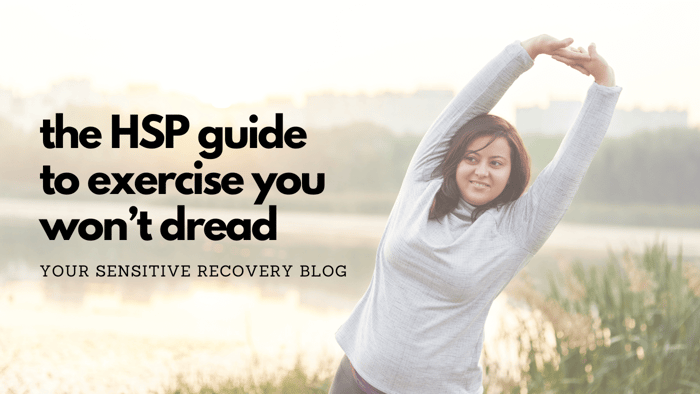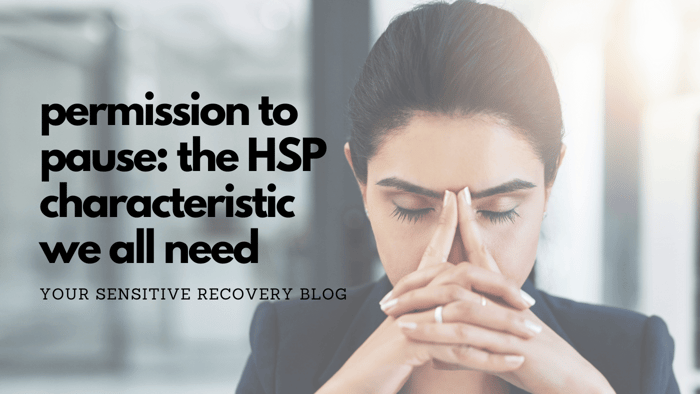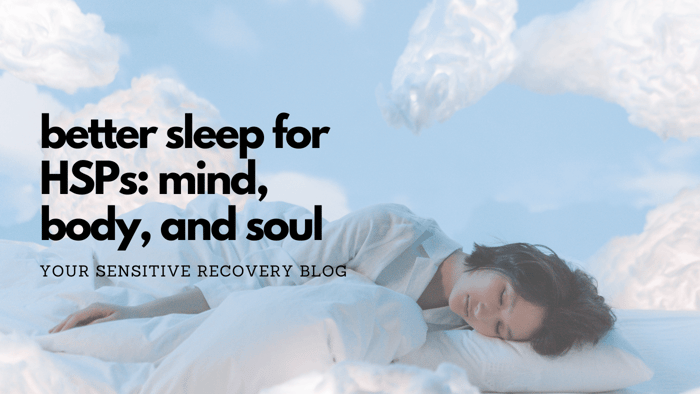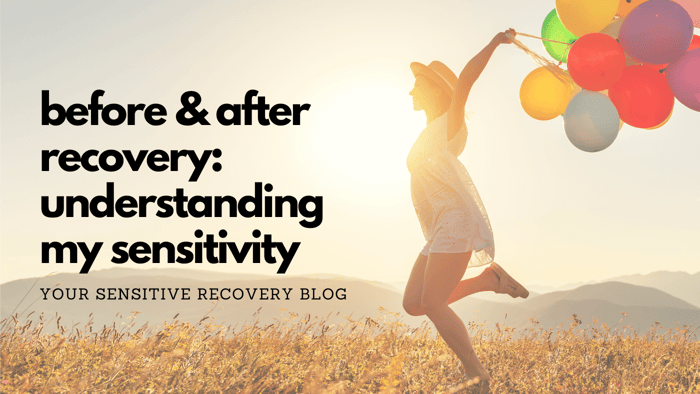Finding true joy in exercise can be a challenge, especially for those of us who are Highly Sensitive or are navigating recovery from a disordered relationship with food and our bodies. If the thought of "working out" fills you with dread, you're not alone, and there's hope for a more positive experience.
In this guide, you'll learn...
- signs of a disordered relationship with movement,
- myths to bust and Movement Mottos to live by instead,
- and tips for approaching movement in an enjoyable and HSP-friendly way.
Throughout this piece, you'll find the 💪 emoji. That means you've stumbled across an exercise science tidbit. There are some pretty interesting ones, so be on the lookout!
Are you ready? Let's say goodbye to the dread and discomfort, and hello to a new way of moving that honors your body, mind, and sensitivity.
Is Your Relationship with Movement Healthy?
How would you describe your relationship with exercise if it were a person? Are you lovers? Frenemies? Do they boost your self-esteem or leave you feeling criticized or shamed?
What about how just the word exercise makes you feel? And working out? Or movement? These three words may elicit very different internal responses. Take a moment to notice those now.
We're all susceptible to the brainwashing of Diet Culture to some degree or another, which not only damages our relationships with food and our bodies but very often our relationship with movement as well.Below are some signs of a disordered relationship with exercise:
- The thought of exercise brings up dread, shame, discouragement, or guilt.
- You exercise when you're sick, injured, or exhausted OR you feel guilty when you cannot do so for those reasons.
- You have an overly rigid workout routine that may interfere with other obligations or opportunities, OR you may go weeks or longer without any intentional movement.
- You use exercise to "make up" for eating OR as permission to eat OR as punishment for what or how much you've eaten.
- You're at the point where you dislike all physical activity.
- You feel compelled to abide by movement rules such as choosing standing over sitting whenever possible, always sneaking in exercise during commercial breaks, etc.
- Your exercise habits feed your ego and promote a feeling of being better than others.
- If you knew beyond a shadow of a doubt that exercise wouldn't change your body, you'd never do it.
If any of these signs resonate with you, you're not alone. A troubled relationship with exercise is treatable, and hope and help are available.
Movement Myths to Movement Mottos
Movement Myth: Changing my body is a good motivator for exercise.
New Movement Motto: PURSUE LOVE, NOT LOSS.
The DL: Unfortunately, the most common motivator for exercise is also the motivator that's most likely to sabotage you, sooner or later. 💪 Did you know that the people who are motivated primarily by weight loss end up doing the least amount of movement? There are so many problems with using weight loss as a motivator but here are just a few. First, the weight loss goal (hopefully) has an endpoint, and even if you do end up getting there, you'll likely drop the routine soon after. Motivation = gone. Second, chasing weight goals usually means people gravitate toward more intense workouts, and for Highly Sensitive People, this might not be the most sustainable or enjoyable option. (More on that later.) There are so many health benefits of exercise that you can still achieve even if no weight is lost. Move your body out of love for yourself, not the desire to shrink.
Movement Myth: If I'm not sweating or breathing hard, it doesn't count.
New Movement Motto: EVERYTHING COUNTS.
The DL: What do you think is generally better for someone: a 5-minute walk or no walk? Well, yes! The 5-minute walk, of course! (This does not include people who need to prioritize rest due to weight restoration, illness recovery, etc.) 💪 Did you know that it's being sedentary that's most harmful and not so much the lack of exercise? When we put limits on what "counts" as exercise, we miss out on so many opportunities for joyful movement. The flaw in thinking goes like this: "Well, I don't have time to walk around the whole block so I might as well skip it" - instead of choosing to walk halfway and back. Everything counts and you can feel good about every little bit of movement you do. Whether it's a 5-minute walk, a yin yoga class, a game of fetch with the pup, parking a little farther away than normal, or a few minutes of lifting heavy objects, give yourself credit. You deserve it.
Movement Myth: I should/have to do (insert activity here) even though I hate it.
New Movement Motto: I CAN MAKE IT MORE ENJOYABLE OR CHOOSE NOT TO DO IT.
The DL: There's a lot of "should-ing on ourselves" when it comes to exercise. This is a sign that there's shame involved in the decision to move or not. Shame can be a strong initial motivator for change, but it never lasts. Instead, we can offer ourselves a compassionate choice. There are a ton of options for how we can choose to move our bodies and another ton of options for how we can alter those activities to make them more enjoyable. 💪 Did you know how you feel about an activity is a better predictor of whether you'll stick with it than how you feel about the value of the activity (why you're doing it)?
Movement Myth: Exercise is a chore.
New Movement Motto: EXERCISE IS A GIFT. NOT A CHORE.
The DL: Can you imagine what would change if we looked at the things that we didn’t feel like doing as privileges rather than chores? I really loathe doing laundry. But when I frame it like this - "I get to do laundry. I actually have clothes to wash and can use this machine instead of scrubbing my clothes in the creek...WOW, what a change. Being able to move our bodies is a gift. For some, mobility is severely limited or not available at all. Choosing to see movement as a gift is not about shaming ourselves for taking things for granted. It's about gratitude.
Movement Myth: I'm lazy if I don't work out.
New Movement Motto: Rest is necessary. Tired is not the same as lazy.
The DL: The word lazy is overused. We usually throw it around every time we have "an attack of the shoulds." But truthfully (as I KNOW you've heard), rest is a requirement for good fitness. In fact, it's a requirement of any kind of productivity. Exercise itself is a bit oxymoronic. It's a stressor that decreases overall stress. It's a fatiguing activity that increases your overall energy levels. The initial hurdle of getting started is challenging, indeed. It's not just you. It helps to look at it like how you'd look at other coping tools and wellness behaviors like meditation. The immediate, short-term benefit will likely not be NEARLY as profound as the long-term benefit. So rest when you need to. You're not doing anything wrong, and you're NOT lazy.
Tips for Exercise You Can Look Forward To
First of all, give it a good name. If the word exercise has always been equated with punishment to you, ditch it. Here are some alternatives: Activity, Intentional Movement, Joyful Movement, Me Time, Fitness, or simply whatever you're doing (walking, swimming, rollerskating). Your meaning of the word you're using or your associations with it are important. 💪 Did you know that a more positive meaning leads to higher levels of motivation?
Take time to make it more comfortable. Highly Sensitive folks can be particularly susceptible to the irritating parts of high-intensity workouts. I'm talking about the heat, the sweating, the chafing, the bouncing boobs, the out-of-breath feeling...I get it. It's ok to make things more comfortable for yourself. It's not cheating. 💪 Did you know you can tolerate high-intensity activity better when you enjoy it and when you choose it for yourself (i.e. not doing it because you feel you "should")? Invest in that good sports bra, work out in front of a fan, or choose an indoor activity if the humidity is unbearable. And if you simply can't stand high-intensity activities, please, just don't do them. Permission granted. Always.
Let your body tell you when to stop instead of a timer, or (god forbid) a calorie counter. Look, I get why these can be motivating for some individuals. It can also be really dangerous for others because we disconnect from our bodies' internal cues and choose external, not-at-all-personalized cues instead. Remember, everything counts. You don't have to reach a certain level or number to make movement worth it.
Nobody is judging you like you're judging you. I promise, if you have to go into Child's Pose mid-yoga class, nobody is going to think twice about it, and they probably won't even think once. What other people think about us is none of our business anyway.
We all have major Main Character Syndrome. Nobody is thinking about us as much as we are thinking about ourselves.Find your "why." 💪 Did you know that as a motivator, "being healthy" is not specific enough to keep most folks moving? Find a reason that resonates on a more personal level. What about your health is important to you? Are you lifting to keep your bones healthy? Do you want to improve your endurance to keep up with your kid? Is strength training helping your anxiety? 💪 Interestingly enough, having too many motivations can negatively impact your overall motivation level. So choose just one or two that really resonate with you.
Focus on what felt good. It's not uncommon for folks to criticize themselves after a workout sesh, class, or even just a walk around the block. You might have thoughts like, "Ugh I got so winded" or "I looked so uncoordinated next to that other person" or "I should have been able to lift more weight on that set." Talk about unmotivating. As you're wrapping up, be intentional about finding at least a few things that felt good. It can be as simple as noticing that you got yourself going even when you weren't sure you had the energy. What a win!
You Deserve a Happy Relationship With Movement
I hope this guide was helpful for you. Remember, listening to your body and choosing activities that genuinely bring you joy are key to engaging in exercise without dread and shame. As a Highly Sensitive Person, your needs may be different, and that’s perfectly fine. Embrace what feels right for you, take it one step at a time, and celebrate the little opportunities for movement.
If you're struggling with exercise addiction or compulsivity, or your relationship to movement feels fraught with pain, reach out to a qualified eating disorder therapist in your area. You deserve it. 💕
💪 Exercise Science Tidbits brought to you by:
Segar, M. (2015). No Sweat: How the Simple Science of Motivation Can Bring You a Lifetime of Fitness. New York, AMACOM--American Management Association.
✨ Josie Munroe, LMFT is a licensed therapist and owner of JosieMunroe.com and Your Sensitive Recovery As a recovered clinician and Highly Sensitive Person, she loves supporting others on their journeys to form new, empowered relationships with food, their bodies, and their sensitivity. Join the newsletter for a weekly boost of hope and inspiration. You deserve a recovery that works for you! ✨





